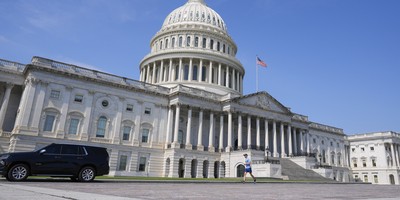There's a big difference between free enterprise and crony capitalism. One fosters competition to serve consumer demands but the other feeds off taxpayers and exploits privileged access to Washington's political class for private gain and protection from competitors. Increasingly, America's corporate giants are opting for cronyism over the rigors of competition.
In 2008, when Washington voted to bail out Wall Street, people across America were outraged. In fact, the seeds of the modern Tea Party movement can be traced back to this momentous event, which sparked voters to mobilize against the cronyism fostered by big government. While the magnitude of the Wall Street bailout was unprecedented-$700 billion-Washington's rush to dole out money to special interests was, unfortunately, business as usual.
As the reach of government grows, more often than not, the road to corporate profits runs through Washington. Many corporations have come to rely on government largesse rather than innovation and entrepreneurship to boost their bottom lines, something that has only been reinforced by the Obama administration's aggressive expansion of the government's control of the U.S. economy. Stimulus spending, health care legislation, and financial services legislation have inserted Washington squarely into activities best decided by the marketplace. Politicians-many of whom decry the role of special interests in Washington-enjoy these new levers of power and the lucrative fundraisers sponsored by those seeking to do business in the world that Congress has created.
With New York and Washington continuing to blur the distinction between the private and public sector, many corporations have set up shop in the nation's capital, with an army of lobbyists working to turn the law in their favor. Few corporations better represent the crony capitalism business model than GE. Hardly described as a bank, GE became a major recipient of the bailout, issuing some $74 billion in debt backed by taxpayers under the Temporary Liquidity Guarantee Program-a program that GE persuaded the government to expand so it qualified as a recipient. At the same time, GE managed to avoid new federal restrictions on executive compensation required under the TARP program.
Recommended
Elsewhere, GE has joined forces with a number of other companies under the banner of USCAP to endorse a costly cap and trade energy program that would drive up the costs of fossil fuels while promoting new forms of energy.
That such companies are interested in alternative energy is admirable; however, forcing American consumers and businesses to subsidize their forays into green energy may not be. Estimates from a number of sources suggest costs could be as much as $1,700 per year per family, and that up to 2.5 million jobs could be lost. At the same time, America's competitiveness will be threatened as jobs and production move offshore to nations such as Brazil, India, and China, which have indicated that they are not willing to hobble their economies with new regulations to reduce greenhouse gas emissions. Given the lack of a global agreement, the trillion dollar efforts of the United States will result in significant economic dislocations with no measurable benefits for climate change.
Consumers and the U.S. economy would bear the burden of this energy policy, but GE and other companies view the bill as an opportunity legislate profits. Senior Fellow with the Free Enterprise Project Tom Borelli notes, "By promoting cap-and-trade, Wall Street is once again betting it can profit from embracing left-wing politics. CEOs see an opportunity to garner praise for themselves as "socially responsible" businessmen while they profit from the sale of renewable energy products, such as wind turbines, and from the trading of carbon dioxide emission credits."
As a long time member of the military industrial complex, GE is no stranger to Washington. Defense spending has always been a lucrative source of earmarks and pet projects and GE has reaped its share of the benefits. Currently, the conglomerate is seeking funding for an aircraft engine that neither the Department of Defense nor the Air Force wants. Both the Bush and the Obama administrations attempted to eliminate the funding for this engine, but earmarks and strong-arm lobbying tactics have led Congress to reject all efforts to end this unnecessary and costly project.
For 14 years, Congress has been funding two engines from separate engine contractors for the F-35 Join Strike Fighter, a move initially meant to spur competition and reduce costs. Development of the GE-Rolls Royce engine has been a remarkably slow process, but continues to receive taxpayer dollars.
It is projected that it will cost at least an additional $2.9 billion to finally finish the engine. In comparison, the developed and certified engine produced by Pratt & Whitney has already had an impressive 17,500 hours of testing and has successfully powered vertical flight operations.
Nonetheless, the House recently voted to continue funding the GE-Rolls-Royce engine, and the issue has now moved to the Senate.
GE typifies the large rent seeking companies that wage battle not in the marketplace, but in the halls of Congress. Taxpayers and consumers cannot afford to fund the pet projects of politicians and corporations, especially in an economic downturn. Unfortunately, the consumer's voice has been lost in the din of corporations scrambling for government handouts.























Join the conversation as a VIP Member